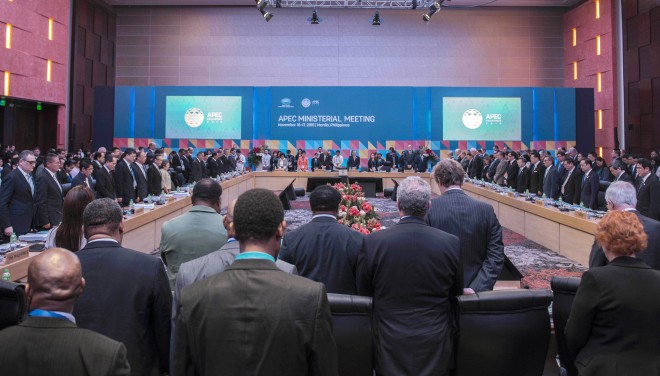
Officials have a moment of silence for those who were involved in deadly attacks in Paris, during the Asia-Pacific Economic Cooperation (APEC) Ministerial Meeting in Manila, Philippines, Monday, Nov. 16, 2015. (Lui Wai Siu/Pool Photo via AP)
MANILA, Philippines — Tensions with China and the Paris attacks could upstage trade issues at the Asia Pacific Economic Cooperation summit, being held under extra-heavy security in the Philippine capital this week.
President Barack Obama and the leaders of China, Japan, Mexico and other nations in the 21-member APEC bloc are converging with 7,000 other officials, CEOs and other participants at a convention center by Manila Bay.
The meetings culminate in a 2-day summit of leaders beginning Wednesday.
Russia’s president, Vladimir Putin, is skipping the Manila meetings, partly to focus on an investigation into the Oct. 31 crash of a Russian passenger jet in Egypt that killed all 224 people on board. He will be represented by Prime Minister Dmitry Medvedev. Indonesian President Joko “Jokowi” Widodo will likely stay home to deal with domestic problems, according to Philippine officials.
Founded in 1989 in Canberra, Australia, APEC aims to demolish barriers to trade and investment through nonbinding accords. The unwieldy grouping of countries and self-governing territories that range from liberal democracies to dictatorships accounts for 3 billion people, half of global trade and 60 percent of world GDP.
Critics say APEC, which has focused mainly in economic and trade issues, has few concrete achievements because of its nonbinding status. They dub it a talk shop and joke the acronym means “A Perfect Excuse to Chat.” But proponents believe those qualities are its strengths.
“That’s exactly the beauty of APEC, you don’t have to worry about committing yourself to anything because it’s non-binding,” said Philippine Finance Secretary Cesar Purisima. “It gives leaders the freedom to bounce ideas, new ideas.”
Though members tend to shy away from divisive security and geopolitical issues, rifts and political strife often overshadow the annual show of unity that is symbolized by the photo-op of leaders dressed in quirky or traditional shirts provided by the host country.
Friday’s attacks in Paris that killed at least 129 people have already created a dilemma for APEC. The Islamic State group claimed responsibility for the attacks on a stadium, a concert hall and Paris cafes.
Behind closed doors, senior diplomats were divided over whether to issue a statement on the attacks or let each leader speak on his or her own. The compromise: a paragraph on terrorism is being added to the APEC summit statement.
One diplomat rejected any mention of the attacks in the statement, fearing it would draw the Islamic State group’s attention to APEC, said a Southeast Asian diplomat who attended the meetings. The diplomat spoke on condition of anonymity because the conversations were not intended to be public.
The diplomat said the United States wanted a strongly worded response and APEC’s response could still change when the leaders meet.
They have a precedent. APEC leaders issued a statement in Shanghai in October 2001 to condemn the attacks in the U.S. the month before and vowed to help combat terrorism.
Including any security-related topic in APEC’s formal talks is touchy for China, which fears that could pave the way for discussion of territorial conflicts in the South China Sea. Beijing says the disputes are an Asian problem that outsiders such as the U.S. have no business dabbling in.
The Philippines has been the most outspoken among the six APEC governments that have territorial disputes with Beijing in the South China Sea. On Monday, as economic ministers met ahead of the summit, anti-Chinese protesters burned a Chinese flag to vent their anger over the territorial standoff.
“Boycott all China products,” said a banner at the protest, which took place outside the U.S. Embassy in Manila — not in front of the Chinese Embassy.
China’s top diplomat, Wang Yi, visited Manila last week and asked the Philippines not to raise such contentious issues during the APEC summit for the sake of the “political dignity” of Xi’s visit, Philippine diplomats said.
China and the U.S. are constantly jockeying for economic and political clout in the region, during APEC summits and other occasions, and at the moment Xi is battling headwinds given the friction over territorial spats.
Massive Chinese construction work aimed at turning seven disputed South China Sea reefs into islands that could be used militarily have raised alarm. In contrast, two U.S. military patrols in seas claimed by China, including flights last week by a pair of B-52 bombers near the artificial islands, were welcomed by America’s allies in Asia.
“The U.S. image in the region is again on the rise and China’s has taken a bit of a battering due to its actions in the South China Sea, the slowing growth of its economy,” said Malcolm Cook of the Institute for Southeast Asian Studies in Singapore.
The recent success in wrapping up protracted talks on a free-trade deal called the Trans-Pacific Partnership has also boosted Obama’s prestige, said Ernie Bower, director of the Southeast Asia program at the Center for Strategic and International Studies.
The deal includes the U.S. and 11 other Pacific Rim countries, but not China.
“Obama and the White House have done everything they need to do to be well prepared for a strong Asia trip,” Bower said. “Obama will be received in Manila as an American leader who ‘gets Asia’ and is emphasizing U.S. long-term interests.”